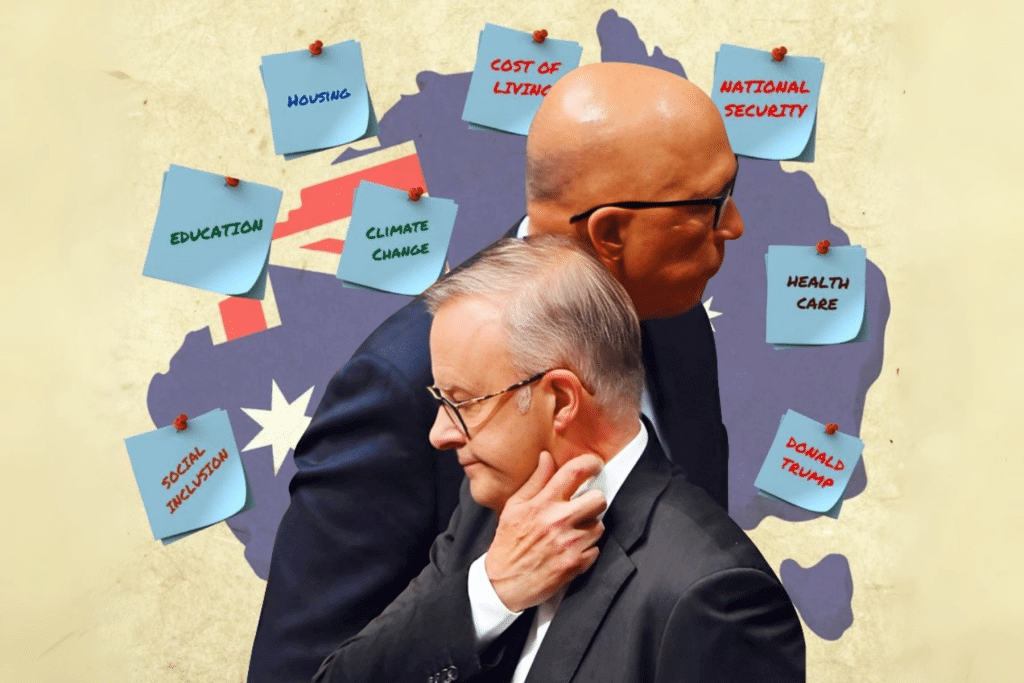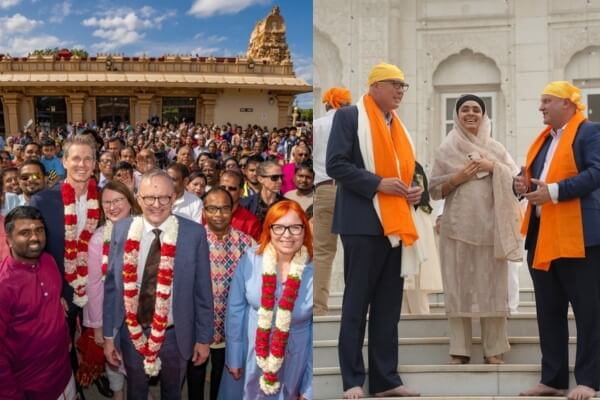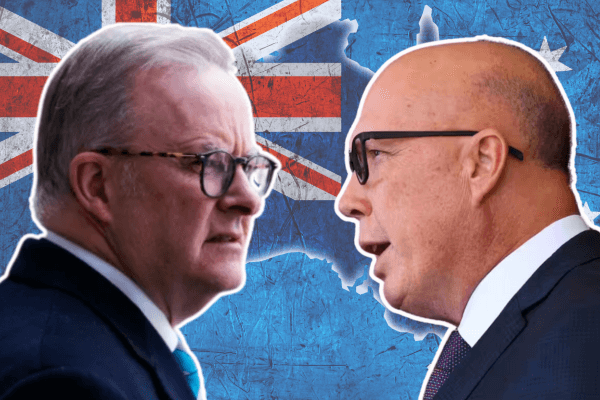In an Indian Link survey to gauge voting intentions within the Indian community in Australia, the Australian Labor Party (ALP) under its leader Anthony Albanese has emerged as the clear frontrunner, receiving majority of support.
Standing out clearly as a liability for Coalition leader Peter Dutton, was the election of Donald Trump in the United States — and the perceived ideological alignment between the Republican Party and Australia’s Liberal-National Coalition.
This, along with electioneering backflips on issues such as work from home and cutting down on public sector jobs, seem to have turned more people off than brought in supporters.
Indian Link’s Election Survey 2025 was conducted between 11 and 21 April.
The online election survey drew responses from 1,053 participants nationwide.
The largest age group represented was 35–54 years (44.7%), followed by 55–64 (19.2%), over 65 (18.3%), and 18–34 (16.5%). A small number of respondents chose not to disclose their age.
In terms of gender, responses were skewed, with 61% identifying as male and 36% as female. The remaining 3% identified as other or chose not to disclose their gender.
Australia’s Indian community is actively courted by all major political parties – and for good reason. With numbers approaching one million (though not all are eligible voters), Indian-Australians now make up nearly 4% of the national population. Their rapid growth, combined with the fact that many reside in marginal electorates, makes them a key demographic that political leaders can’t afford to ignore.
Given this growing significance, the results of this survey highlight community sentiment regarding political leanings and priorities: they provide an understanding, at this stage of the election, of how Indian-Australians are engaging, and what issues are shaping their vote.

The leading contenders: ALP vs Coalition, Albo vs Dutton
In response to the question, “If an election were held today, which political party would you vote for?”, 43% of respondents indicated support for the ALP, while 27% opted for the Coalition of Liberal and National parties – highlighting a significant lead for Labor.
The Greens secured third place with 12% of the vote, followed by Independents at 7%. This lower share is largely due to the dominance of major parties in marginal electorates that many Indian-Australians call home.
About 9% were still undecided, and the Coalition may need to work harder to win over the undecideds and narrow their gap with Labor.

“The Coalition doesn’t care for working class and migrant people,” commented one respondent, while another wrote, “The ALP works for middle-income families.”
As regards preferred Prime Minister, there is no doubt in the minds of those polled: an overwhelming 70% gave their approval for Anthony Albanese.
In the comments section however, it was Peter Dutton that generated more discussion – and not favourably. Respondents voiced concerns about his leadership style, policy positions, and alignment with more extreme political stances. The volume and tone of commentary around Dutton may well highlight his perception as a polarising figure.

This also suggests that Albanese’s lead may stem less from passionate support and more from a rejection of the alternative.
“Both leaders are uninspiring at the moment, but my vote will be for Albo,” was one comment, while some others wrote “Dutton seems unsure of his leadership”, and “Dutton doesn’t give me a good vibe.”
The question “Which party will be better for the Indian-Australian community?” has typically been interesting, because the community does not vote as a bloc. Equally, perceptions have been known to change, with views and attitudes shifting progressively over the course of settlement in Australia.
From a pure numbers’ viewpoint, 59% of the respondents this time round were for the status quo in Labor, while 30% favoured the Coalition. (The rest were for the Greens, a political party for which community support became apparent first in the 2022 elections).

That the ALP has been able to relate better was evident in comments such as “The ALP is pro migrants and has been supportive of all Indian events,” “Many Labor leaders seem genuinely interested in the community and in India,” and “It is good to observe Albo’s regard for India and its Prime Minister and senior ministers when they visit here.” Clearly “the Boss’s” appearance at the Qudos Arena is still etched in memory.
Liberal leaders have in the past managed similar connect (think ScoMo’s curry selfies and Tony Abbott sitting barefoot and cross-legged on the floor for a gurudwara meal), but not Peter Dutton thus far. (“What’s he doing here,” someone asked at the Australian Sikh Games in Sydney recently. “Is he ticking the diversity box?”)
“Anyone but Liberal,” remarked one respondent, while another said, “LNP without Peter Dutton”.
“ALP with Greens support,” suggested a third.
There were some however who reported “None”, while one person wrote, “Their (Labor and Liberal politicians’) interactions with us in the community are really the same, so should it matter?”
On Immigration Policy
None of the policies on offer seem to be capable of handling immigration, many of the respondents claimed. “Australia needs people in spite of all the baloney the politicians lecture,” one respondent wrote. “We do not have enough people to even build the houses which are needed right now. Look at how Labor has allowed so many people in, but remember the times of the Liberal/Coalition in power – nothing was moving in DHA then. It is a joke.”
“No party has long-term, sustainable, flexible immigration policy,” was another comment.
Regardless, that 55% of those surveyed ticked the box for Labor on this question, may well have been a “stick-with-the-devil-you-know” attitude.

Others said they picked Labor “because they tend toward lower and more measured immigration policies than the Liberals,” and “because their balanced approach to immigration focusses on economic growth and worker protections whereas Coalition wants to reduce migration numbers and strengthen border controls to address domestic concerns,” and because they are “not thrilled with Liberals wanting to implement more rigorous visa assessments.”
Immigration has remained a thorny issue in recent years, with policymakers struggling to strike the right balance. It will continue to challenge whichever government comes in after 3 May.
Cost of living
Coming down to the issue that has been in the headlines for most of the last twelve months – cost of living – we asked voters in the Indian-Australian community which party they thought would do a better job in addressing pressures.
The reputation of the Coalition of being sound economic managers did give them a boost in this section of our polling. They secured 40% of the votes but again, Labor trumped them at 60%.
The comments made for some interesting reading, with one respondent pulling us up for not including the Greens here. “Why isn’t this an option here when they’ve been banging on about housing and cost of living???”

But others were more sanguine, one commenting, “It will take some time to improve the cost of living. Only time will tell. The world is in turmoil at present.”
Another added to this theme: “Neither party – given US tariffs and the wars across the world, there is not much either party can do at the domestic level.”
Other comments indicated the frustration at the lack of strong action in this regard. “Both parties are offering sugar hits rather than structural changes”, and, “I pick none – as they both don’t get it – they do what will get them re-elected”.
The Coalition’s demonstrated strengths here notwithstanding, did our results reflect, again, a ‘better the devil you know’ sentiment? Or were our respondents saying: ‘While the Coalition demonstrates strength in this particular area, their broader platform lacks substance, making the alternative party a more appealing option overall’?
The Trump effect
Given Donald Trump’s influence on global politics, we asked our respondents: To what extent do you believe his political influence and policies in the United States have impacted political attitudes, policymaking, or public discourse in Australia?
The answers to this question polled had an interesting trajectory. Initially, the feedback was rather benign, with polls saying that there will be limited impact. But then the pendulum swung, with the final – 37% saying Trump’s policies will have ‘quite a bit’ of impact and 31% ‘somewhat of an impact’ on the political discourse in Australia.
The Indian Link Election Survey was conducted just as the impact of Trump’s ‘Liberation Day’ tariffs was beginning to bite, triggering a dramatic plunge in equity markets across Australia, India, and the world. Headlines spoke of a ‘bloodbath’ and ‘trillions wiped off’ global share values, underscoring for the Indian-Australian community the tangible consequences of US policies – rising costs and the spectre of stagflation.

Although both leaders Albanese and Dutton distanced themselves from the events unfolding in the US, the ideological similarities between the Liberal National party and Trump’s Republican Party were difficult to ignore by the those being polled.
Dutton’s early regard for Trump (“I will be able to work with the Trump administration Mark II to get better outcomes for Australians”, and descriptions of him such as “big thinker and a dealmaker… shrewd”) did not go down well, and that sentiment has stuck despite his sudden distancing (“I don’t know Trump … I’ve not met him”).
Still, Trump-like elements in Dutton’s image have not helped: his populist rhetoric and anti-elitism (positioning himself as a representative of the “common man” against perceived elites), his hardline immigration policies (reducing immigration numbers and implementing stricter border controls), his climate policy scepticism (opposing renewable energy targets and advocated for nuclear power), his attacks on public media, his nationalistic slogans (“Get Australia Back on Track” paralleling Trump’s “Make America Great Again”), and his suggested creation of a ‘Department of Government Efficiency’ and DOGE-style public service job cuts (which he changed later to the less problematic “hiring freeze”).
“I was concerned to see MAGA style caps in Australia’s election!” one comment said.
On policy announcements aimed specifically at Hindu communities
Clearly, this was the issue that evoked the strongest response from the Indian Link Election survey. We asked: Do you think it is appropriate for Australian political parties to make policy announcements aimed specifically at Hindu communities?
A brief background to this issue: both major parties these elections are reeling from the hostile reception they are getting from the Muslim vote. And so religion also seems to have factored into efforts to court the community vote. With Hinduism as the third largest religious group and the fastest growing religion in Australia according to Census 2021, it is an increasingly attractive vote bank. Both Labor and the Coalition have promised over $8,000,000 to help set up a Hindu school in Sydney. This after the NSW Government and Premier Chris Minns made good on an election promise to provide a sum of over $2,000,000 to the state’s Hindu community. It was important to gauge public sentiment through polling on the use of identity politics by our leaders to consolidate support among specific voter groups.
(Meanwhile, in recent days, the ALP has announced $7 million for the Murugan Temple and $2 million to a Jain group, both in Western Sydney; and $700,000 to a Sikh charity, $440,000 to the gurudwara in Officer VIC, and support for Melbourne to host the 2026 Australian Sikh Games.)

Recent discussions on the issue on public platforms like Reddit, and an article on Hindu-phobia in The Australian have had vicious comments on the relevance of these schools in modern day society. One writer noted, “I want Australian kids to go to Australian schools where they all meet every kind of Australian. Rich, poor, white, non-white, religious upbringing, non-religious upbringing. If a parent wants to supplement their child’s education with something specifically religious or cultural there is still time to have a Sunday school, something in the afternoons, or summer camps. I’d prefer that than having entire schools that are a segregated mono-cultural for 5 days a week for 12 years of a child’s life.”
Another one: “It’s the classic Australian compromise: allow some gods into the budget, just not the ones that the tabloids disapprove of. The real miracle is how quickly a ‘Christian nation’ transforms into a multi-faith democracy when swing seats are at stake.”
In the Indian Link Election Survey, an overwhelming 52% strongly criticised these policy announcements aimed specifically at one religious group, picking the option “No, policies should not target specific religious groups.”
22% differed, picking the option “Yes, it does reflect cultural and social inclusion”.

Respondents who expressed support for such political outreach to the Hindu community, viewed it as recognition of their growing presence, economic contributions, and underrepresentation compared to other religious groups. (“Small Jewish groups get all sorts of benefits, so why shouldn’t Hindus?” was one comment). Some felt Hindus have been overlooked or unfairly targeted, and welcomed attention from politicians as a step toward inclusivity and safety.
A large number of respondents voiced strong opposition to religion-specific political pledges, especially those targeting Hindus. Many felt such promises are opportunistic, surfacing only during election time as a form of vote-bank politics. (“It’s a gimmicky thing to do – aiming to grab votes from the community,” one respondent wrote.) Critics emphasised that government policies in a secular democracy like Australia should be inclusive, equitable, and religion-neutral. They warned that mixing religion with politics is divisive, risks importing communal tensions from India, and undermines Australia’s multicultural and secular values. Others questioned the motivation behind such policies, calling them tokenistic and potentially discriminatory, especially in a diverse Indian diaspora. There was a clear call to uphold the separation of religion and state, and to resist any influence of religious identity in political decision-making.
The comments for this question reflected the sharp division which religion can incite on a public forum. (Head here to read all the responses to this questions on our survey).
20% of respondents said they agreed with the Hindu-specific policy announcements as long as similar benefits are provided to other groups also. Interestingly, most in this category came from the younger age groups. (There is evidence that Gen Z individuals tend to favour equality among all religious groups and value inclusivity and secularism over asserting a singular religious identity. Reasons for this have been cited as their diverse upbringing, value for authenticity and fairness, and scepticism of institutions. While Gen Zs may not ignore religious identity, they prefer expressions of it that are inclusive, personal, and respectful of other beliefs.)
There’s another way to view these funding announcements: rather than simply vote-chasing, they could reflect a recognition of the Indian community’s growing civic influence, and a willingness to support organisations that have a demonstrated record of community impact. Among Indian-Australian groups, the Hindu Council of Australia – and gurudwara committees in Victoria – stand out for their sustained, large-scale outreach. Their visibility and effectiveness may well explain why they have been recipients of significant government support, while other associations have not yet reached a similar level of engagement.
Issues of concern: Cost of living tops the list
As expected, cost of living is highest on the mind of the Indian Australian voter, just as it is with the mainstream Australian voter.
Healthcare, housing and education follow at numbers two, three and four. These issues directly affect the hip pocket, and as largely first-generation migrants with limited financial means, better access to good healthcare for the older respondents and good education for the more recent migrants, are paramount. Securing their first home as new migrants is also on top of their minds. Indian Link Election Survey

National security was less of a concern for Indian-Australians: coming from India which sees border skirmishes frequently as well as insurgency within, the safety in their new home seems to take at least that issue off their minds.
Environment concerns along with national security above stood at number 5, while social inclusion and sadly, women’s issues brought up the rear. Interesting the Indian Link Election survey of 2022 also had similar ranking for women’s issues and social inclusion. Perhaps one might be tempted to blame this low rank on a skewed gender ratio in the survey, a sobering thought when advocating for women’s rights should be a gender-neutral issue.
Conclusion
The Indian Link Election survey indicates a strong preference within the Indian-Australian community for continuity, amidst a volatile global political landscape. In these uncertain times, voters appear to favour Albo’s safe hands on the steering wheel, as opposed to handing over the car keys to a new and untested driver.
A cautionary note however for the Indian-Australian community: it must urgently recognise the rising tide of identity politics – a trend that sees politicians on both sides prioritising short-term vote banks through religion- or culture-based overtures over the long-term health of Australia’s social cohesion. Ignoring this now – or failing to challenge it – could come at a serious cost to the inclusive values that bind us together.
The Indian Link Election Survey results reveal also that ultimately, Indian-Australian voters closely reflect the broader Australian electorate – attuned to pressing national concerns such as the cost of living, housing, healthcare, and leadership. Their choices at the ballot box are shaped by a shared civic identity rooted in the responsibilities of citizenship, not by cultural affiliation.
Read More: From migration to representation: Indian-origincandidates in Federal Election 2025





